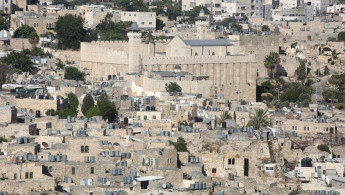Hamas warns over Israel president's visit to Hebron mosque
Hamas has warned of "repercussions" over plans by Israel's president to visit Hebron's Ibrahimi Mosque in the occupied West Bank during the Jewish festival of Hanukkah.
On Friday, Israeli President Isaac Herzog's office said he would take part in a candle-lighting the ceremony on Sunday at the mosque, which is also called the Cave of the Patriarchs.
The holy site is revered by both Muslims and Jews. After Israel occupied the West Bank in 1967 it divided it into separate Muslim and Jewish places of worship.
Hebron, which is the biggest city in the West Bank, is home to more than 200,000 Palestinians. About 1,000 Israeli settlers, who engage in frequent attacks on Palestinians, also live there under heavy military protection.
"The Israeli occupation must bear full responsibility to the repercussions of this assault," Ismail Radwan, a senior Hamas official, said in a statement on Friday.
The candle-lighting "is a provocation of the Palestinians' feelings and a blatant desecration of the sanctity of the mosque," he said, calling on Palestinians "to ward off this provocative move".
Hebron has seen regular unrest, and the shrine believed to be the burial site of biblical figures including Abraham, is frequently the focal point of tensions.
In 1994, Israeli settler Baruch Goldstein killed 29 Palestinian Muslim worshippers inside the shrine with an assault rifle before being beaten to death by survivors.
The announcement by Herzog's office also drew the ire of Israel's leftist anti-settlement Meretz party.
On Friday, Britain officially designated all of Hamas an "Islamist terrorist organisation".
The Al-Qassam Brigades, the military wing of the group that rules the Gaza Strip, has been banned in Britain since 2001 but the ban has now been extended to its political entities.





 Follow the Middle East's top stories in English at The New Arab on Google News
Follow the Middle East's top stories in English at The New Arab on Google News
![Both Hamas and the Palestinian Authority welcomed the ICC arrest warrants [Getty]](/sites/default/files/styles/image_330x185/public/2024-11/GettyImages-2178351173.jpg?h=199d8c1f&itok=TV858iVg)

